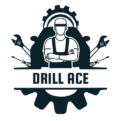Drill Speed & Bit RPM Calculator
Get the right settings for your project. This drill speed calculator helps you find the recommended RPM and torque for drilling into wood, metal, concrete, or tile. Using the correct drill speed prevents damage to the bit and your material.
How This Calculator Works
This tool provides estimates based on industry best practices. The ideal drill speed (measured in Revolutions Per Minute, or RPM) depends primarily on the material’s hardness and the drill bit’s diameter.
- Harder Materials (like metal, concrete): Require slower speeds and higher torque to prevent overheating the bit and to provide enough force.
- Softer Materials (like wood): Can be drilled at higher speeds with lower torque.
- Larger Drill Bits: Require slower speeds. The outer edge of a large bit travels much faster than the edge of a small bit at the same RPM, generating more friction and heat.
Disclaimer: Always start slow and increase speed gradually. These recommendations are a starting point. Refer to your drill and drill bit manufacturer’s guidelines for specific instructions.
